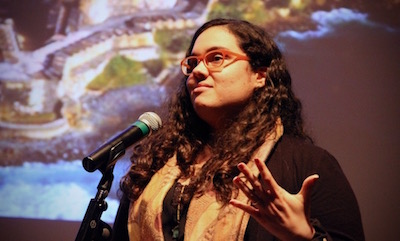‘Where We Were, Where We Are, Where We’re Going’.

“My grandpa always says, ‘Late justice isn’t justice at all,’” student Paola Sepulveda-Miranda told an audience of 50 at the second annual BUSPH Stories event, titled “Where We Were, Where We Are, Where We’re Going,” on October 20.
Sepulveda-Miranda, a lawyer by training who comes from Puerto Rico, was one of seven students who told stories about how they came to public health, and what issues continue to motivate them, at the event hosted by the SPH Student Senate and Graduate Student Life. The event was free, with donations at the door for One America Appeal’s hurricane recovery efforts in Puerto Rico, Texas, Florida, and the US Virgin Islands.
Catherine Bernards described her practicum in Vancouver, British Columbia, where she worked at North America’s first safe injection site. One day, she said, someone came running out of an alley near the site, looking for help, and she followed him back to his friend, who had overdosed.
Bernards carries the overdose-reversing medicine naloxone—also known by the brand name Narcan—and held up her kit while telling her story. When she bought her first kit, in Boston, she said the pharmacist didn’t ask any questions, but also didn’t give any instruction. “I realized, even if I knew how to identify an overdose, I wouldn’t know how to use naloxone,” Bernards said.
She had undergone a training in Vancouver, however, and was able to save that person’s life. If she had never gotten trained, she said, and just had naloxone, “the outcome could have been very different.” Making the 5- or 10-minute training more widely available—as it is now in Vancouver—could make that difference for so many more people, Bernards concluded.

Alex Gitungano shared the story of how he came to Boston from Burundi, a story that was also a two-part Boston Globe feature in 2015. In, 2014 he agreed to accompany a little boy named Leo Ikoribitangaza, who is now 7 years old and continuing to receive care at Shriners Hospitals for Children in Boston for burns he sustained on his face and head when he was 2.
“Raising Leo has changed my life,” Gitungano said. He told the story of his own childhood, as a refugee from Burundi’s civil war in the Democratic Republic of the Congo, where his family was targeted by violent groups and eventually had to escape, via a wooden boat on Lake Tanganyika, back to Burundi. “Why did all of this happen to me?” he said he asked growing up, and again when he had first arrived in Boston with Leo and felt overwhelmed and alone.
Gitungano, a devout Christian, said his faith has given him the strength to take on each challenge, including balancing work on his MPH and raising Leo. As Leo grows up, Gitungano said the boy gives him tremendous hope to help vulnerable people and make positive changes in the lives of others. “There’s still hope, even when a tree is cut down, for it to sprout again,” he said.
Sepulveda-Miranda described growing up in Puerto Rico and becoming a lawyer, motivated to help fight the disparities that US policy exacerbates in the territory.
“After Hurricane Maria changed Puerto Rico forever, I realized just how different Puerto Rican citizenship is from the citizenship of other Americans,” she said. Because many Americans don’t know Puerto Ricans are American citizens, “we had to use the ‘we are American citizens’ campaign,” Sepulveda-Miranda said, explaining the sense of injustice such an argument brings up. “Aren’t we humans? Don’t we deserve aid, action, and justice regardless?”
A month after the hurricane, most of the island is still without electricity, and Sepulveda-Miranda said many of her friends and family members are struggling to access clean drinking water—while media coverage moves on, she said, and federal aid continues to be sluggish. “It is necessary not just to act, but to act on time,” she said.
“I invite you all to act, and to bring justice on time.”
In one step toward that goal, Olaoluwa Omotowa, president of the Student Senate, announced after the stories that the event had raised $1,350 in donations at the door. Between the event and the month’s SPH apparel sale and student bake sale, students donated a total of $1,500 to One America Appeal for hurricane recovery.